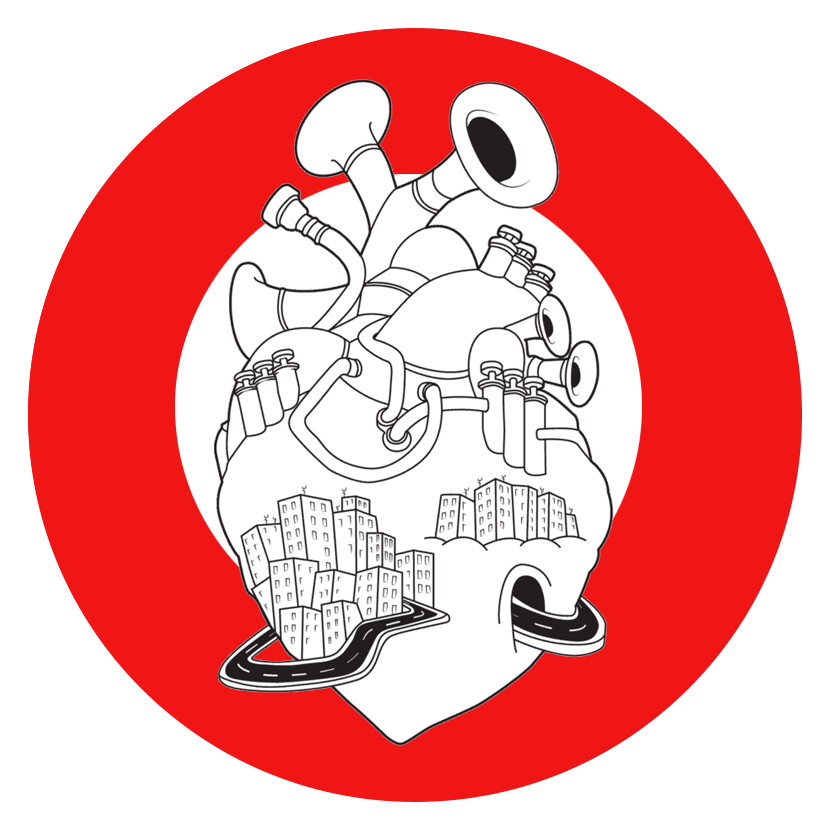
From Split to Belgrade, through ex-Yugoslavia - August 5-19, 2007
A periodic report from Agent Orange 001/2
The first contingent of theTituguard disembarked at early dawn on the quite shores of Split and quickly moved on to Mostar for the initial encounter in Bosnian territory. In no time, the platoon conquered the hearts and minds of the local population but quickly depleted their explosive CD’s and sent urgent messages to the Rome headquarters for more supplies.
Five years earlier,Titu troops had paved the way bringing their revolutionary message in the streets and squares of cities in the Balkans. From Mostar the Titubanda advanced to Sarajevo where more successes awaited them.
The focal area of combat was Guca, deep in the heart of Serbia. It was in this stronghold of big Balkan brass bands that I had decided to join the main contingent. My flight from Rome to Belgrade established a new record; transponder problems forced the JAT plane back to Rome arriving in Belgrade at three A.M., fourteen hours later. Unfazed by the ordeal of the transponder, I descended on Guca.
The real battle of the bands was going to take place deep in Serbian territory and I was determined to be with the troops. With fuzzy information about lodging, I was elated when I fortuitously met the brave fighters heading for their encampment on the outskirts of the town, not far from the theater of action.
Over the years, Guca has witnessed vicious skirmishes of the toughest bands in the Balkans; a brass monument to the brave trumpeter stands in the center of the town.
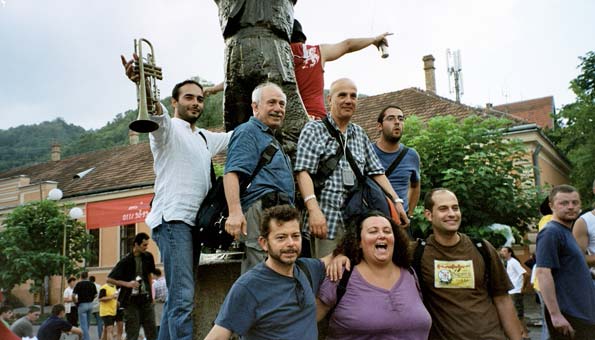
Strategy planning at the Monument of the Trumpeter in Guca by the top echelon.
The area around the monument was the theater of tactical movements for territorial control and musical one-upmanship: the loudest band is usually more generously rewarded by the masses that come to Guca for the yearly encounters. Scenes of debauchery were evident everywhere; overtones of nationalistic fervor as exhibited by the dress and behavior of some of the unruly revelers were but a distant echo of Woodstock.
The commercial and primitive aspect of the three day orgy made festival veterans yearn for the simple and genuine atmosphere of the past.
The question used to be: how many people can you squeeze in a Volkswagen Beetle? Well, the new question is: how many Titubanda troops can you squeeze in a 19 seat mini van? Answer: thirty, plus their fighting gear.
And so the platoon roller coasted through the mountainous terrain from Guca to their rendezvous in Kraljevo where other records was waiting to be broken. How many people can sleep in three and half rooms? Well, the answer is obvious. Vladimir Petrovic, our gracious host in Kraljevo, opened up his heart and house to the band and thanks to his efforts assured the success of our concert along the shores of the Idor River.
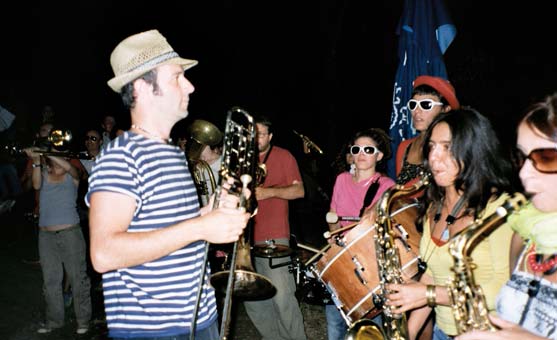
On a riverside raft, a journalist, looking for a scoop, fired endless questions eager to find out who was the commander of the invading Roman legion. Frustration was written all over her face. How can a band function without a leader? Good question! The river side concert along with endless rakia toasts rocked the raft all night long and pleased the locals gathered to acclaim the fun loving legionnaires.
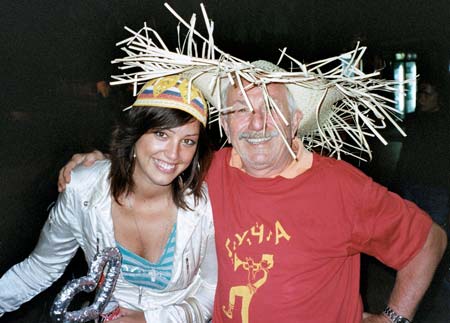
The secret agent in camouflage with a local beauty
The journey from Kraljevo in a luxurious 54 seat bus with three open vents on the roof provided acrobatic opportunities for Spiderman as the bus rolled on Sabac to the astonishment of the people along countryside roads.
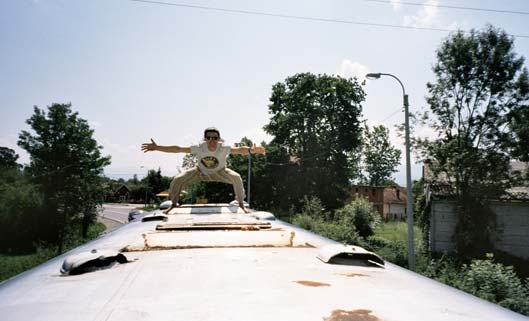
Spiderman doing his thing on top of the bus
Five star accommodations - basket ball size gymnasiums some with rubber mattresses- awaited us in Sabac and Novi Sad as well as Zrenjanin:. The latter had to be evacuated by 9.00 AM – an unpleasant shock for late rising Titu warriors- so that local athletes could use the sports facilities.
The true spirit and tradition of the Titubanda came to life in final performances in the cities near Belgrade. Reminiscent of the commedia dell’arte itinerant troupes who in centuries past wandered all over Europe, their descendants brought the musical and theatrical traditions of their Italian forefathers entertaining the local hosts who shed their inhibitions (briefly forgetting their recent sufferings) and danced in the town squares and parks. The joy and wonder on children’s faces were just as rewarding for the Titu players as the dinars that the adults put in the cappello or passing the hat.
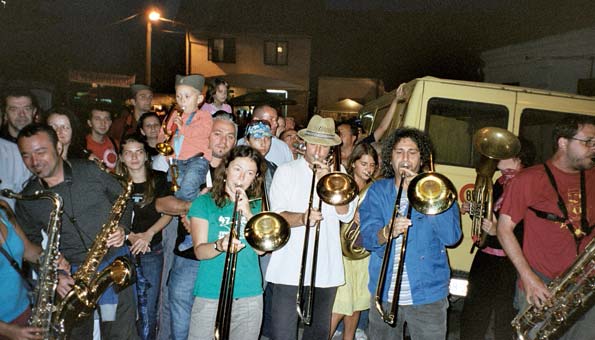
A young Guca trumpeter being initiated into the Titubanda
As the troops entered Belgrade for the final assault, there was evidence of battle fatigue compounded by the torrid heat and pollution as the steaming bus approached the capital. Logistical problems resulted in temporary disarray but as time neared for the concluding series of cappelli the weary veterans converged to the appointed square. Belgrade was theirs for the taking and in true Titubanda tradition they gave it all for the glory that was Rome.
The troops disbanded in Belgrade while the braver ones proceeded for points north to meet fresh troops for final concerts in Pula.
|
